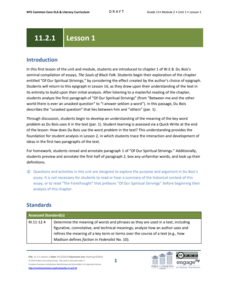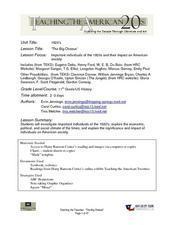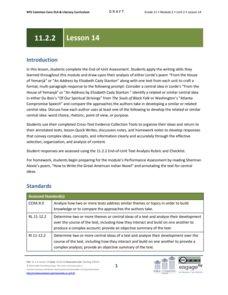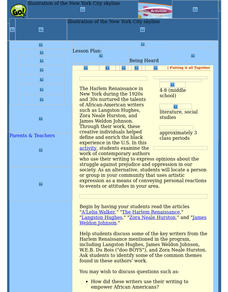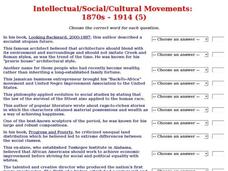Alabama Department of Archives and History
Two Different African-American Visions: W.E.B. Du Bois and Booker T. Washington
The strategies civil rights activists Booker T. Washington and W.E.B. Du Bois proposed for blacks to achieve racial progress is the focus of an activity in which class groups identify the strategies as well as the benefits and drawbacks...
Odell Education
Making Evidence-Based Claims: "The Souls of Black Folk" by W.E.B. Du Bois
Scholars dig deep into the text of W.E.B. Du Bois The Souls of Black Folk and analyze his position that black people must be aware of how they see themselves as well as how the world sees them. The instructor and readers work through the...
American Institute of Physics
Historical Detective: Edward Alexander Bouchet and the Washington-Du Bois Debate over African-American Education
Young scientists meet Edward Alexander Bouchet who, in 1876, was the first African American to receive a PhD in Physics. This two-part lesson first looks at the debate between Booker T. Washington and W.E.B. Du Bois about the type of...
Alabama Department of Archives and History
W.E.B. DuBois, Booker T. Washington, and Jim Crow
Class members use the think-pair-share strategy to compare the views of W.E.B. Du Bois and Booker T. Washington and to consider how each man's backgrounds influenced his philosophy.
American Institute of Physics
Physicist Activist: Dr. Elmer Imes and the Civil Rights Case of Juliette Derricotte
Elmer Imes was not only a brilliant physicist but also a civil rights activist. After an introductory lecture, groups read two articles about a traffic accident that killed one Fisk University student and injured several others. The...
Curated OER
Three Visions for African Americans
Students consider the plight of African Americans in post-Reconstruction America. For this African American history lesson, students discover the visions of African American leaders Booker T. Washington, W. E. B. Du Bois, and Marcus...
Albert Shanker Institute
Strategizing for Freedom
Booker T. Washington, W.E.B. DuBois, Marcus Garvey, and A. Philip Randolph developed different views on how to advance civil rights for African Americans. Class members research these famous figures and their strategies before developing...
EngageNY
Grade 11 ELA Module 2: Unit 2, Lesson 12
Why is it important to make connections across texts? Scholars discover the answer with instructional activity 12 of 14 from the Grade 11 ELA Module 2: Unit 2 series. Pupils analyze the development of ideas in three nonfiction texts,...
EngageNY
Grade 11 ELA Module 2: Unit 1, Lesson 1
When is a word more than just a word? Scholars examine the significance of a word used by W.E.B. Du Bois in "Of Our Spiritual Strivings." Readers carry out a deep discussion of the use of the word problem in the text. After sharing ideas...
Facing History and Ourselves
A Contested History
Memories of and interpretations of history change—that's the key takeaway from a lesson that has young historians compare the story of the Reconstruction Era as told by the historians of the Dunning School to the view of scholars today...
Curated OER
Fighting for Democracy, Fighting for Me
Students consider how African American responded to social injustice. In this social injustice lesson, students compare and contrast the visions of Booker T. Washington and W.E.B. DuBois for obtaining civil rights for African Americans.
Curated OER
Dubois and Washington Venn Diagram
Young scholars compare and contrast the visions of W.E.B. Dubois and Booker T. Washington. In this African American history instructional activity, students read biographies about both men and create a Venn diagram about the men.
Curated OER
"The Big Cheese"
Eleventh graders research and examine the significant individuals of the 1920s and their impact on American society. They identify characteristics of people who make a difference, and in pairs conduct research on two people with...
PBS
Booker T. Washington: Orator, Teacher, and Advisor
Imagine teaching yourself to read and write—do you think you could do it? Scholars analyze how Booker T. Washington went from a slave learning to read to a leading educator in the United States. Using video clips, speeches, and primary...
CHPCS
The United States in the 1920s: The New Negro Movement and the Harlem Renaissance
Music, writing, and activism all tell the story of history! The resource uses these elements and more in a presentation to discuss the Jazz Age and Harlem Renaissance. Your class views biographies, discusses important events, and...
EngageNY
Grade 11 ELA Module 2: Unit 2, Lesson 13
Two minds are better than one. Learners engage in an evidence-based discussion to identify central ideas in Audre Lorde's poem "From the House of Yamanjá" and one additional nonfiction text. They complete a Cross-Evidence Collection Tool...
EngageNY
Grade 11 ELA Module 2: Unit 2, Lesson 14
It's time to put it all together! Using the resource, scholars complete an end-of-unit assessment. They write a multi-paragraph essay comparing Audre Lorde's "From the House of Yemanjá" or "An Address by Elizabeth Cady Stanton" to...
Facing History and Ourselves
The Legacies of Reconstruction
The final instructional activity in the seven-resource Reconstruction Era collection examines the legacies of Reconstruction. Class members investigate why the period has been called an "unfinished revolution," "a splendid failure," and...
Facing History and Ourselves
Violence and Backlash
Revolution and counterrevolution. Protest and counter-protest. Collaborators and bystanders. The focus of the fifth resource in the Reconstruction Era and Fragility of Democracy series is on the political violence that followed Radical...
CommonCoreSheets.com
The Civil Rights Movement Timeline
Using this simple worksheet, your learners will have the opportunity to practice reading timelines while learning about key events during the civil rights movement in the United States.
Annenberg Foundation
Social Realism
Many American writers in the late nineteenth century wanted their writing to reflect real life. Individuals watch and discuss a video, read and explore author biographies, write a journal entry and a poem, and complete a multimedia...
Penguin Books
Up Close: Ella Fitzgerald
A reading of Tanya Lee Stones' biography of Ella Fitzgerald lets middle schoolers get up close and personal with the First Lady of Jazz. Stone recounts details of Fitzgerald's life from her early days through her experiences as a teenage...
PBS
Being Heard
Examine the work of contemporary authors who use their writing to express opinions about the struggle against prejudice and oppression in our society. A short lesson plan on the Harlem Renaissance introduces learners to the most...
Curated OER
Intellectual/Social/Cultural Movements: 1870s - 1914 (5)
In this online interactive American history worksheet, students answer 12 matching questions regarding late 1870's-1914 America. Students may submit their answers to be scored.










